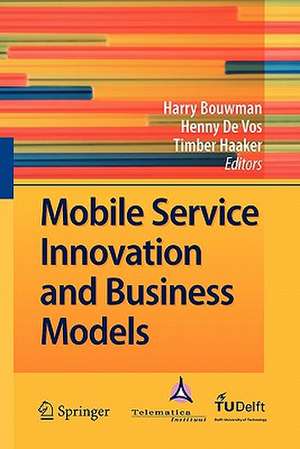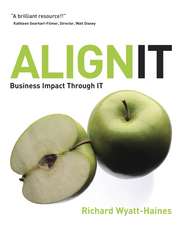Mobile Service Innovation and Business Models
Editat de Harry Bouwman, Henny de Vos, Timber Haakeren Limba Engleză Paperback – 19 oct 2010
| Toate formatele și edițiile | Preț | Express |
|---|---|---|
| Paperback (1) | 643.34 lei 6-8 săpt. | |
| Springer Berlin, Heidelberg – 19 oct 2010 | 643.34 lei 6-8 săpt. | |
| Hardback (1) | 648.24 lei 6-8 săpt. | |
| Springer Berlin, Heidelberg – 12 iun 2008 | 648.24 lei 6-8 săpt. |
Preț: 643.34 lei
Preț vechi: 756.86 lei
-15% Nou
Puncte Express: 965
Preț estimativ în valută:
123.11€ • 127.81$ • 102.66£
123.11€ • 127.81$ • 102.66£
Carte tipărită la comandă
Livrare economică 22 martie-05 aprilie
Preluare comenzi: 021 569.72.76
Specificații
ISBN-13: 9783642098123
ISBN-10: 3642098126
Pagini: 344
Ilustrații: XIII, 327 p.
Dimensiuni: 155 x 235 x 18 mm
Greutate: 0.5 kg
Ediția:Softcover reprint of hardcover 1st ed. 2008
Editura: Springer Berlin, Heidelberg
Colecția Springer
Locul publicării:Berlin, Heidelberg, Germany
ISBN-10: 3642098126
Pagini: 344
Ilustrații: XIII, 327 p.
Dimensiuni: 155 x 235 x 18 mm
Greutate: 0.5 kg
Ediția:Softcover reprint of hardcover 1st ed. 2008
Editura: Springer Berlin, Heidelberg
Colecția Springer
Locul publicării:Berlin, Heidelberg, Germany
Public țintă
ResearchCuprins
Theory.- Service Innovation and Business Models.- Conceptualizing the STOF Model.- STOF Model: Critical Design Issues and Critical Success Factors.- The Mobile Context Explored.- The STOF Method.- What’s Next? Some Thoughts and a Research Agenda.- Applications.- A Practitioner View on Generic Design Issues and Success Factors.- The Dynamic STOF Model in Practice.- A We-Centric Service: The PolicePointer.- Balancing Customer and Network Value of Mobile Payment Services.- Robustness of IPTV Business Models.- Mobile Service Bundles.- Designing Mobile Remittance Services in Developing Countries.- Assessing the Business Potential for New Mobile Services from Mock-Up Evaluation.- A Standalone Digital Music Vending Service.- From Prototype to Exploitation: Mobile Services for Patients with Chronic Lower Back Pain.- From Prototype to Exploitation: Organizational Arrangements for a Personalized Dementia Directory.
Textul de pe ultima copertă
Modern economies depend on innovation in services for their future growth. Service innovation increasingly depends on information technology and digitization of information processes. Designing new services is a complex matter, since collaboration with other companies and organizations is necessary. Service innovation is directly related to business models that support these services, i.e. services can only be successful in the long run with a viable business model that creates value for its customers and providers. This book presents a theoretically grounded yet practical approach to designing viable business models for electronic services, including mobile ones, i.e. the STOF model and – based on it – the STOF method. The STOF model provides a ‘holistic’ view on business models with four interrelated perspectives, i.e., Service, Technology, Organization and Finance. It elaborates on critical design issues that ultimately shape the business model and drive its viability.
Caracteristici
Consists of a business model framework, a practical method and numerous cases The framework has a perspective on service, organization, finance, and technology













